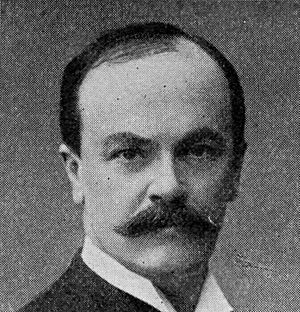Gerhard Louis De Geer facts for kids
Quick facts for kids
(Gerhard) Louis De Geer
|
|
|---|---|
 |
|
| Prime Minister of Sweden | |
| In office 27 October 1920 – 23 February 1921 |
|
| Monarch | Gustaf V |
| Preceded by | Hjalmar Branting |
| Succeeded by | Oscar von Sydow |
| Personal details | |
| Born | 27 November 1854 Kristianstad, Sweden |
| Died | 25 February 1935 (aged 80) Östra Göinge, Sweden |
| Political party | Independent |
| Spouse | Magdalena Sörensen |
| Alma mater | Uppsala University |
Baron Gerhard Louis De Geer (born November 27, 1854 – died February 25, 1935) was a Swedish politician. He was often known as Louis De Geer. He came from a noble family in Finspång.
De Geer served in the first chamber of the Riksdag (Sweden's parliament) from 1901 to 1914. He was also the governor of Kristianstad County from 1905 to 1923. Most notably, he became the Prime Minister of Sweden for a short period. This was for 121 days between 1920 and 1921.
Contents
Louis De Geer's Early Life and Career
Family Background and Education
Louis De Geer was born on November 27, 1854. His family was part of the Swedish nobility. He was born in Kristianstad, a city in the province of Scania. His father, Louis Gerhard De Geer, had also been a Prime Minister of Sweden. His mother was Countess Caroline Wachtmeister.
Louis De Geer studied law at Uppsala University. After finishing his studies, he began his career in politics.
Entering Politics
De Geer became a member of the first chamber of the Riksdag. He represented Kristianstad County from 1901 to 1914. He also served as the governor for that same county from 1905 to 1923.
At first, De Geer was a moderate liberal politician. He later joined the Liberal Coalition Party in 1912. However, he left that party by 1914. After this, he became more independent in his political views.
Important Work and Social Reforms
In the years that followed, Louis De Geer led a committee. This committee suggested creating an eight-hour workday in 1919. This idea was very important for workers. His work on this topic helped him build stronger connections with the social democrats.
Becoming Prime Minister of Sweden
The Political Situation in 1920
In 1920, the current Prime Minister, Hjalmar Branting, had to step down. This happened after his party lost the election. Branting tried to delay the process. He wanted to prevent a right-wing government from taking power.
King Gustaf V, the head of state, then spoke with the leaders of the political parties. He wanted to understand the situation in the parliament. The right-wing leaders were against the idea. However, the social democrats accepted an interim (temporary) government. This government was chosen by the King.
De Geer's Short Term as Prime Minister
The King asked Louis De Geer to become the new Prime Minister. He led a coalition government. This government included both liberals and moderate conservatives. The plan was for this government to stay in power until the parliamentary elections in October 1921. These elections would be the first to include general voting rights for everyone.
Challenges and Resignation
Louis De Geer and his government faced many challenges. Neither the left-wing nor the right-wing parties fully supported them.
A proposal for a higher tax on coffee was made by the Minister of Finance, Henric Tamm. This idea was strongly voted down by the parliament. Because of this, Tamm resigned from his position. Just three days later, Louis De Geer also resigned. His resignation came after the other ministers in his government wrote a joint letter. They demanded that the King choose between them and the Prime Minister.
Louis De Geer's Political Views
Views on Key Issues
Louis De Geer was strongly against keeping the union between Sweden and Norway if the Norwegian people did not want it. He believed in respecting their wishes.
When it came to voting rights, he supported the liberal party's ideas. He wanted elections where the majority of votes decided the outcome. He also believed in having a strong army, which was different from the liberal party leader Karl Staaff's views.
His Character and Legacy
Louis De Geer was known for being a quiet and gentle person. His government did not receive strong support from either the left or the right. Both sides wanted to use his government as an example of what they were against for the upcoming elections.
De Geer played a role in a time of big changes in Sweden. His father had helped create a new system for how parliament worked in 1865. Louis De Geer then helped hand over power to the political parties after the first elections where everyone could vote.
See also
 | James B. Knighten |
 | Azellia White |
 | Willa Brown |

